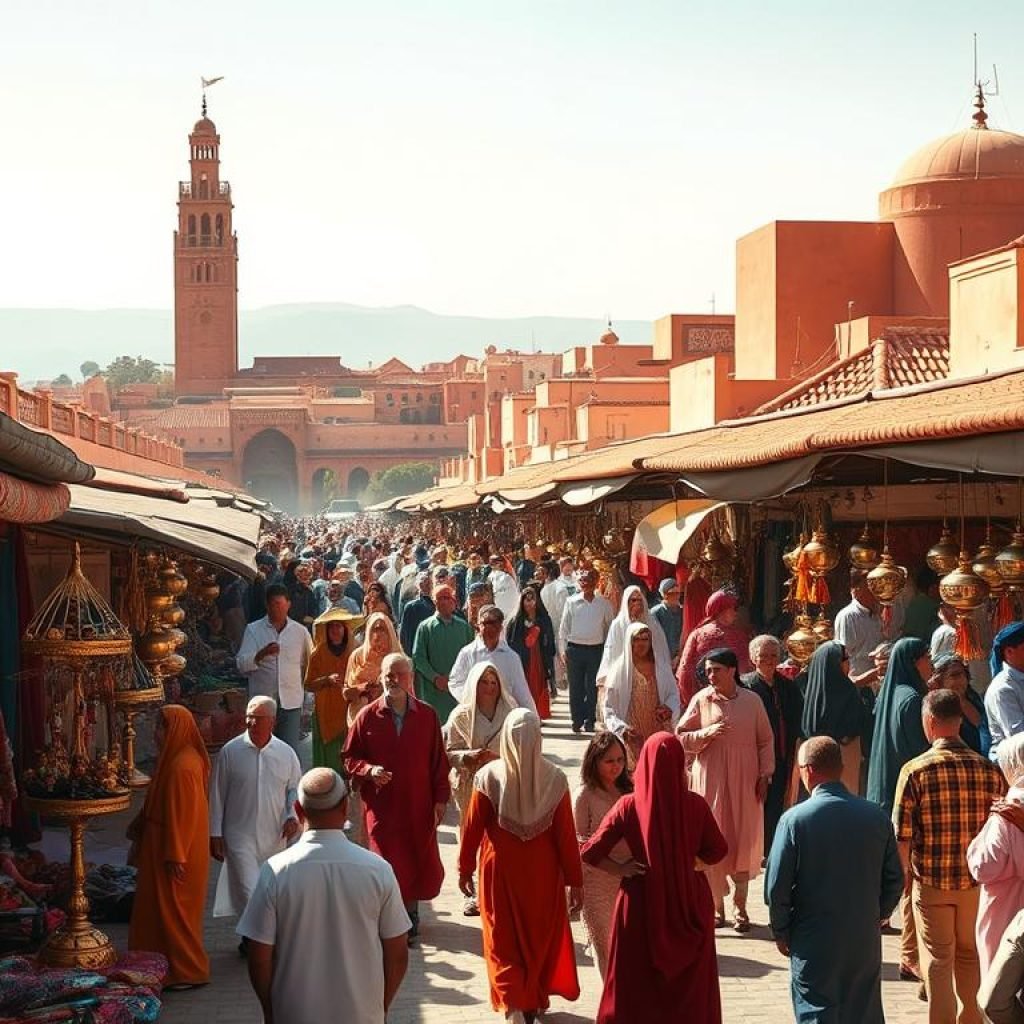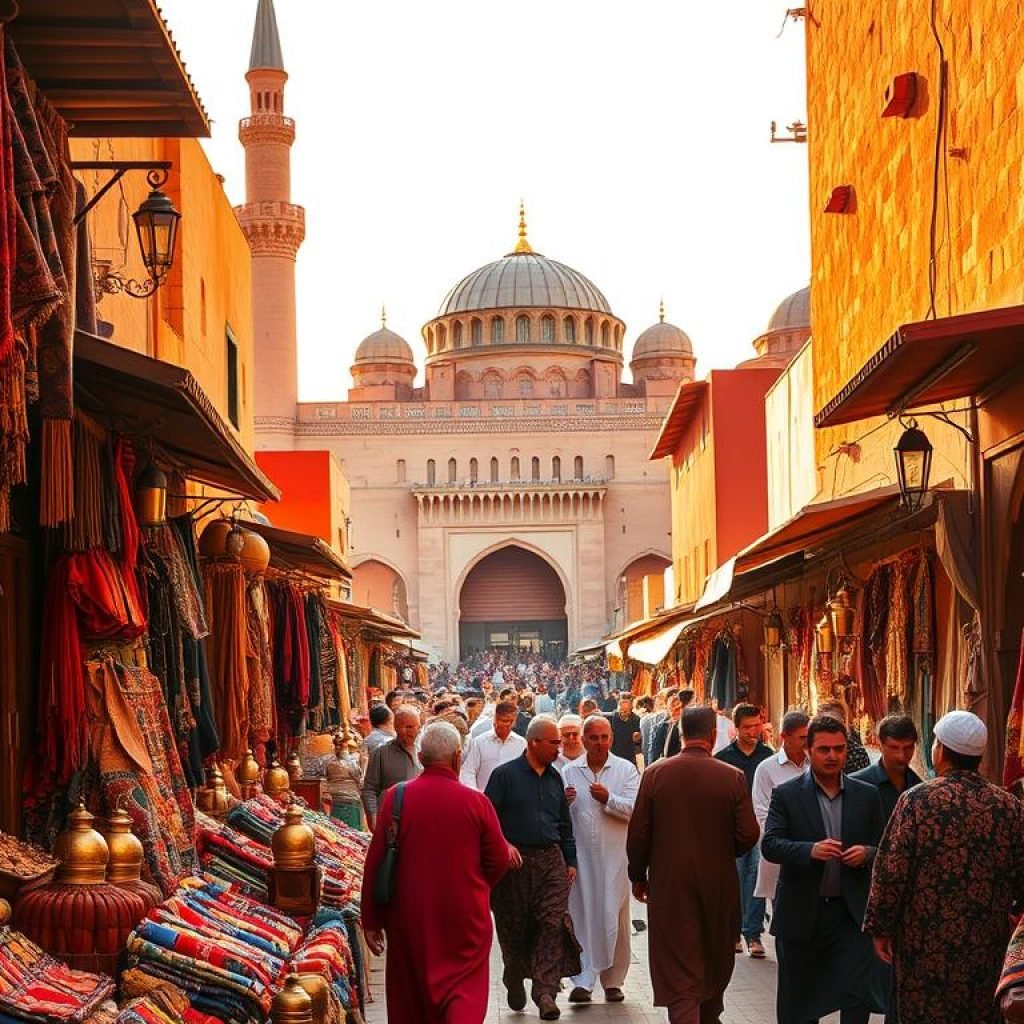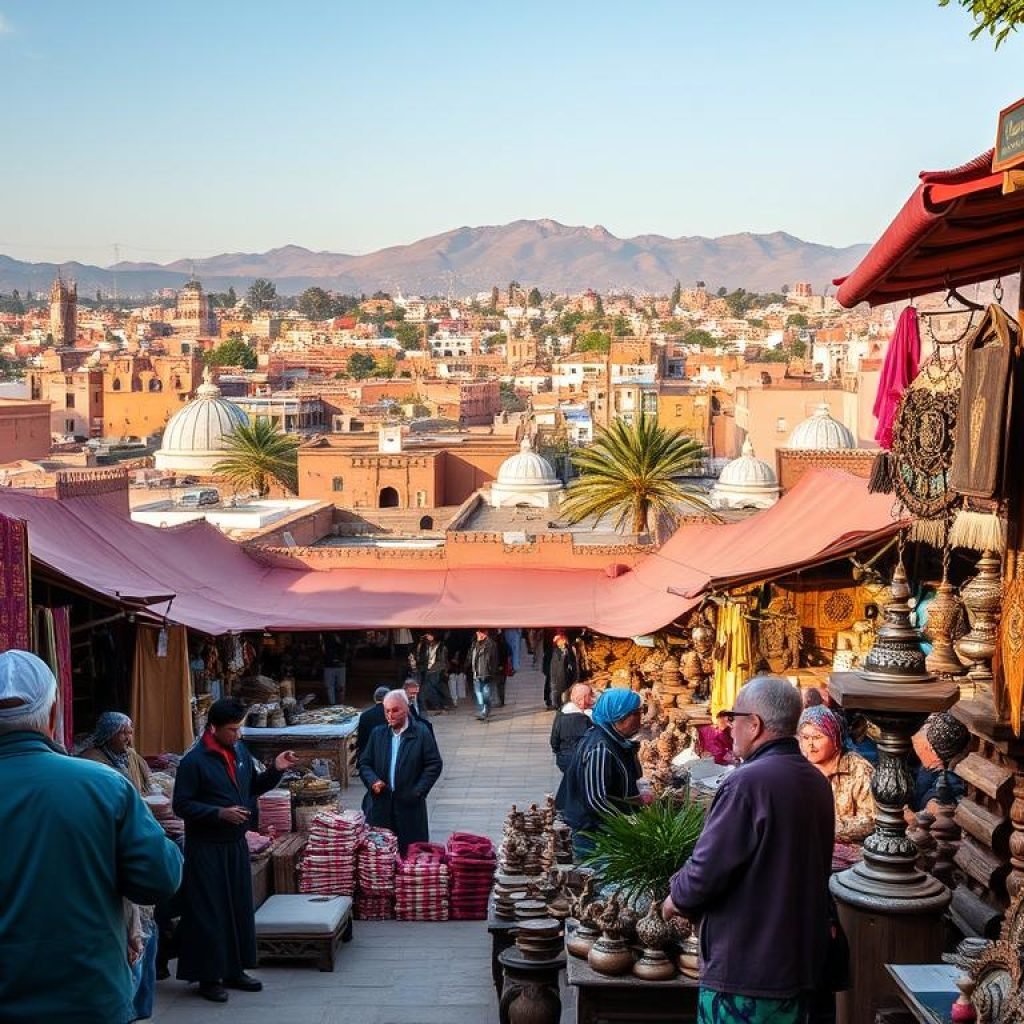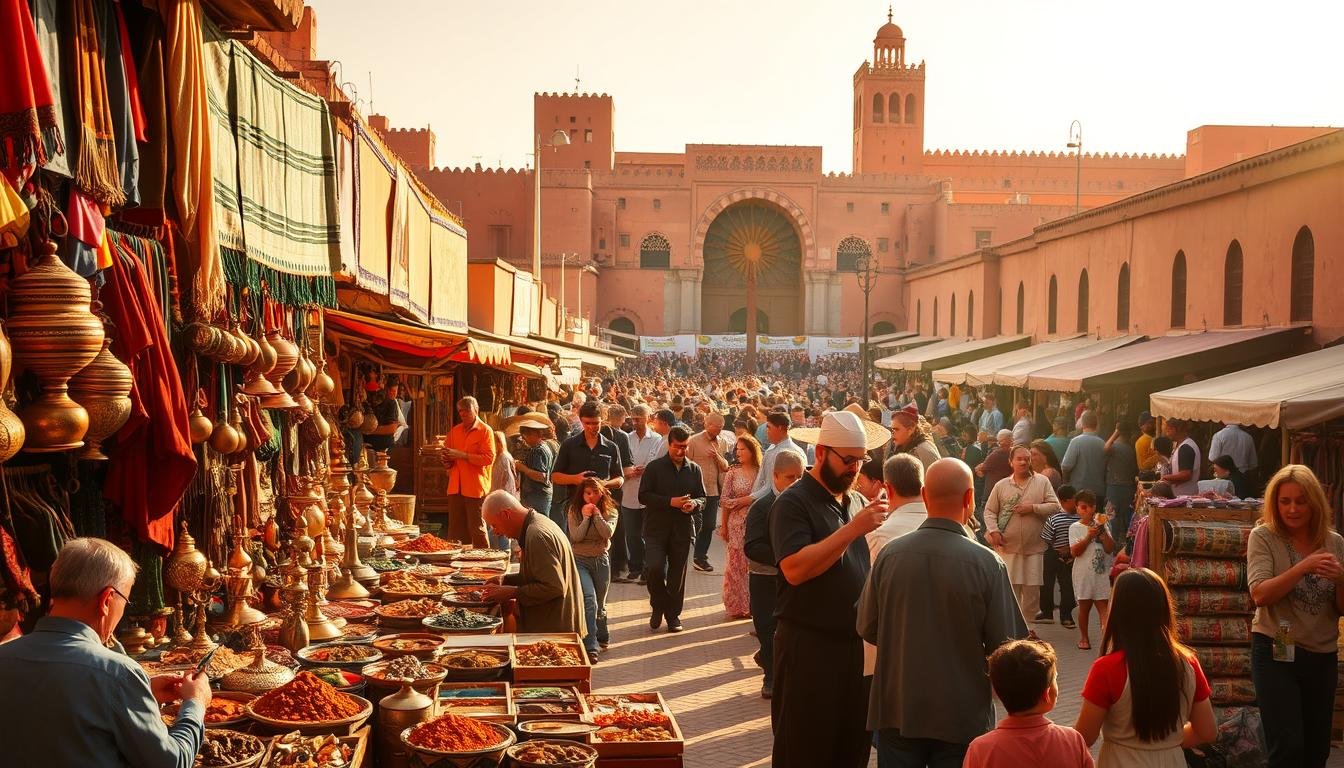Morocco is a country rich in culture, and its festivals show this off. The Marrakech Popular Arts Festival is a big hit in Marrakech. It features music, dance, theater, and visual arts. This festival celebrates Moroccan culture, blending old traditions with new entertainment.
Imagine being surrounded by Morocco’s vibrant sounds and colors. The Marrakech Popular Arts Festival is just one of many. Festivals like the Essaouira Gnaoua and World Music Festival and the Fez Festival of World Sacred Music offer a peek into Morocco’s cultural heritage.
Key Takeaways
- Morocco is home to a wide range of festivals that celebrate the country’s history, music, art, and spirituality.
- The Marrakech Popular Arts Festival is one of the most popular festivals in Morocco, showcasing traditional art forms and modern entertainment.
- The best time to visit Morocco for festivals is during the spring and autumn seasons.
- Moroccan festivals offer a unique blend of ancient folkdances and contemporary performances.
- The Essaouira Gnaoua and World Music Festival and the Fez Festival of World Sacred Music are just two examples of Morocco’s vibrant festival scene.
- Moroccan culture is known for its warmth and hospitality, making festivals a great way to experience the country’s traditions and customs.
Introduction to Moroccan Festivals
Moroccan festivals are a lively showcase of the country’s cultural heritage. They feature a wide range of performing arts and folklore. These events give a peek into Morocco’s soul, highlighting its history, music, art, and spirituality.
These festivals celebrate Morocco’s varied traditions and customs. Each region brings its own unique taste and style. From the folklore of the Atlas Mountains to the performing arts in cities, there’s something for everyone.
Some top festivals include the Marrakech Popular Arts Festival, the Fes Festival of World Sacred Music, and the Essaouira Gnaoua and World Music Festival. These events highlight Morocco’s rich cultural heritage. They also offer a stage for local and international artists to share their talents.
Moroccan festivals are a must-see for those interested in folklore, performing arts, and cultural heritage. With their vibrant colors, lively music, and tasty food, these festivals make a lasting impression.
The Magic of Marrakech Popular Festivals
Marrakech is a city full of life and culture. It hosts many festivals every year. These events show off music and dance from both local and international artists. The Marrakech Popular Arts Festival is a big highlight, being an annual event that celebrates Moroccan folk culture.
This festival is a showcase of many artistic forms. You can see traditional music and dance, theater, and visual arts. It draws people from everywhere, giving local artisans a chance to display their skills and crafts.

The festival has a big impact on the local community. It helps keep cultural heritage alive and gives local artisans a chance to sell their work. With its rich culture and friendly people, Marrakech’s festivals are a must-see for anyone who loves music and dance from all over the world.
Celebrating Music and Dance in Essaouira
Essaouira, a charming coastal town in Morocco, is famous for its lively music and dance. It celebrates the country’s rich cultural heritage. The town has many festivals, like the Gnaoua World Music Festival. This festival mixes traditional Gnaoua music with jazz, blues, and reggae.
The Gnaoua World Music Festival happens every June. It brings together local Gnaoua musicians and artists from around the world. This event shows how important traditional art forms are in keeping cultural heritage alive. It also offers workshops on Gnaoua music and dance, letting visitors learn about Moroccan culture.
But Essaouira’s music and dance scene goes beyond the Gnaoua World Music Festival. The Essaouira Arts Festival also takes place here. It features a variety of performing arts, like music, dance, and theater. This festival brings together local and international artists, promoting cultural exchange and collaboration.
Some key highlights of Essaouira’s music and dance scene include:
- Traditional Gnaoua music and dance performances
- Collaborations between local and international artists
- Workshops on Gnaoua music and dance
- A wide range of performing arts, including music, dance, and theater
Essaouira’s music and dance scene is a lively and dynamic part of the town’s rich cultural heritage. It shows the importance of traditional art forms and performing arts in keeping Moroccan culture alive and thriving.
Religious and Cultural Celebrations
Moroccan culture is rich and diverse, with threads of folklore, music, and dance. The country’s festivals show off its unique culture and traditions. The Mawazine Festival of World Music is a big deal, celebrating Morocco’s cultural and spiritual heritage.
The Fès Festival of World Sacred Music is also important, happening in May or June. It brings musicians from everywhere to share and celebrate music and dance. The festival mixes traditional Moroccan tunes with modern styles, making Moroccan culture lively and varied.

Festivals like these are key to Moroccan folklore and the country’s events calendar. The Marrakech Popular Arts Festival celebrates traditional Moroccan arts in July. It features folk singers and dancers, showing off Moroccan culture and folklore.
These festivals are very important, offering a chance for artists to shine and for visitors to see Morocco’s rich heritage. Events like the Mawazine Festival and the Fès Festival show Morocco’s vibrant culture and its dedication to keeping traditions alive.
Unique Festivals in Tangier
Tangier, in northern Morocco, is famous for its rich culture and traditions. The city has many festivals each year. These festivals highlight its lively music, dance, and local artisans.
The Tangier Ethnographic Festival is a big event. It celebrates the city’s cultural diversity. It also shows off the talents of local artisans.
The festival has lots of activities. You can see traditional music and dance, check out handicrafts, and join cultural workshops. It’s a chance to dive into the city’s culture and learn about local customs.
Another festival is the International Circus Festival of Tangier. It brings circus artists from all over the world. You can see acrobatics, juggling, and clowns. It’s a fun way to enjoy Tangier’s music and dance scene.
Some key events in Tangier include:
- Traditional music and dance performances
- Handicraft exhibitions and cultural workshops
- Circus acts, including acrobatics and juggling
- Cultural festivals, such as the Tangier Ethnographic Festival
These events and activities show Tangier’s rich culture and lively music and dance. It makes Tangier a unique and exciting place to visit.
Craftsmanship and Heritage Festivals
Morocco’s rich cultural heritage is celebrated in many festivals. These events highlight traditional art and craftsmanship. The Festival of Roses in El Kelaa M’Gouna, for example, takes place in May. It celebrates the rose harvest, showing how art preserves heritage.
The Festival of Almond Blossom in Tafraoute is another highlight. It happens in February and celebrates the almond blossom. The festival includes traditional music, dance, and crafts, showcasing cultural preservation. These festivals boost tourism and support local economies.

Both festivals showcase Morocco’s deep cultural heritage and its dedication to traditional arts. They are essential for anyone wanting to see Morocco’s unique culture. By attending, visitors can learn about Morocco’s history and traditions. They also get to experience the warm welcome of the Moroccan people.
Conclusion: Why You Should Experience Moroccan Festivals
Morocco’s festivals are a window into the country’s rich culture and traditions. The Marrakech Popular Arts Festival highlights Moroccan music, dance, and crafts. The Gnaoua World Music Festival in Essaouira offers a unique look at Moroccan culture and traditional arts.
Whether you love Gnaoua music, the Mawazine Festival’s performances, or El Kelaa M’Gouna’s rose celebrations, these festivals are unforgettable. They promise an experience that will touch your heart and stay with you forever.




Comment (0)